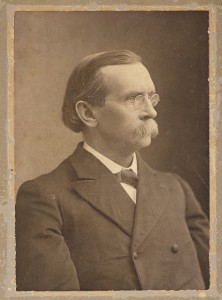 More than 800 letters donated to the University of Mississippi’s Archives and Special Collections shed light on the state’s history from 1858 to 1901, covering everything from the Civil War to the trial of a man charged with the murder of William Faulkner’s grandfather.
More than 800 letters donated to the University of Mississippi’s Archives and Special Collections shed light on the state’s history from 1858 to 1901, covering everything from the Civil War to the trial of a man charged with the murder of William Faulkner’s grandfather.
The letters belonged to Thomas Spight, who was a UM law student, Confederate soldier, Mississippi legislator during Reconstruction, a district attorney and U.S. representative. Recently, they were donated by his great-grandchildren, Thomas Spight Hines, of Los Angeles, Calif., and Mattie Spight McDowell, of Sumrall, Miss.
Hines, who is from Oxford, graduated from UM and is now a professor of history, architecture and urban design at the University of California, Los Angeles, said the writings are mostly correspondence between Spight and his wife, Mary Virginia.
“They are love letters in the beginning,” Hines said. “They are very romantic, and there’s a lot of family minutiae, but they frequently discuss interesting issues.”
The Spights had seven children, two of whom attended UM. Hines said UM Archives and Special Collections is the natural place for the letters, given the family’s deep connection to Ole Miss and the quality of the archives there.
The letters tell the story of a successful man during an interesting time in Mississippi’s history.
Spight was born in 1841. He was a UM law student but joined the Confederate Army after the Civil War started. He fought at the battles of Shiloh and Atlanta, and about 30 of his letters are from the front lines. While he was a loyal Confederate officer, he nonetheless refers to the war as “insane” in his writings. Following the war, he passed the bar exam and became an attorney. He also became one of the first former Confederates to serve in the Mississippi Legislature during Reconstruction.
Spight also founded and became the first editor of the Southern Sentinel newspaper in Ripley.
“He was a very literate man and a good writer,” Hines said.
Spight persuaded Col. William Clark Falkner, whose wife was Spight’s cousin, to write articles for him. Falkner was an author of several books, railroad builder and statesman. He was also the great grandfather of Nobel Prize-winning author William Faulkner, who was named after him and was inspired to become a writer like the elder Falkner. Some accounts say Col. Falkner dropped the “u” from his last name, and William Faulkner added it to his.
Later, Spight would become district attorney for the area. He prosecuted a man for William Clark Falkner’s murder in Ripley. Falkner’s business partner in their railroad enterprise, R.J. “Dick” Thurmond, was tried for his killing in 1891. The two had fought bitterly about the railroad’s operations, according to historical accounts, but Thurmond was acquitted.
During the trial, Spight’s letters show he was concerned about the makeup of the jury.
“The jury was apparently rather pro-Thurmond,” Hines said. “In those small towns in the South during that time, everyone was kin to everyone.”
Spight was also a congressman representing Mississippi’s 2nd District after taking office in 1897, but the collection of letters stops in 1901 following the death of his wife. He served several terms but lost his re-election bid and left office in 1911.
“He was considered too far to the left of center by the James K. Vardaman faction,” Hines said.
Thomas Spight worked in his Ripley law firm after leaving Washington. He died in January 1924 at age 82.
The family’s donation has much value to historians and the general public, which will be able to view the letters, said Jennifer Ford, UM head of Archives and Special Collections and associate professor.
“This is a marvelous gift to the university,” Ford said. “It’s going to add a dimension to our holdings on Northern Mississippi history and U.S. history during some seminal time periods in this country’s life. We’re very grateful to Dr. Hines and Ms. McDowell.”